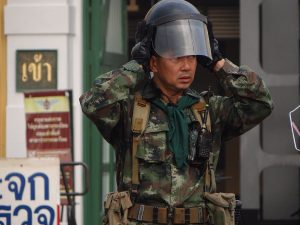Earlier this month, Thailand’s government and insurgents in the country’s south agreed to a pause in violence tied to the month of Ramadan in the latest development in the decades-long southern Thailand insurgency. While the confidence-building measure spotlighted a ray of hope amid continued peace talks, whether or not such moves can get past the challenge of sustaining peace remains to be seen.
The rise of a new wave of violence in Thailand’s Malay-Muslim majority southernmost provinces since 2004 has left over 7,000 dead in what is one of Asia’s deadliest ongoing conflicts. Yet despite multiple rounds of talks between the government and insurgents – at times with the facilitation of neighboring Malaysia – both sides have been unable to find a political resolution to what continues to be one of Thailand’s top internal security challenges.
This year had seen renewed efforts at peace talks between the two sides, after face-to-face talks had been suspended with the outbreak of the pandemic. From January 11-12, Malaysia brokered the first peace talks since the pandemic between the Thai government and Barisan Revolusi Nasional (BRN), the leading separatist insurgency group. Following a second round of talks from March 31-April 1, both sides agreed to a 40-day pause in violence covering the month of Ramadan and began a process of reaching alignment on three key areas: violence reduction, public consultation, and political solution.
The incremental gains within the peace process, fragile and modest though they may be, ought not to be dismissed entirely. Though such pauses in violence have occurred before and have a mixed record of success, they serve as basic confidence-building measures when levels of trust between the two sides are quite low. The latest iteration included an unprecedented provision to allow unarmed rebels to visit their families during Ramadan and accompanying efforts to reduce tensions. Similarly, aligning on key areas can at least begin to identify and then bridge remaining divides between both sides, even if, as Malaysia’s peace broker Abdul Rahim Noor has said, this is still at the early stage of the formation of joint working groups to flesh out these topics.
Yet at the same time, the pause in violence should not distract from the core challenge of forging sustainable peace in Southern Thailand, which is rooted in the political differences that remain between the two sides and within their camps. Episodic attacks that have taken place since January continue to raise concerns about divisions among the BRN and with other groups, such as PULO, which are left out of the talks and could serve as spoilers further down the line.
More broadly, there are also lingering concerns about whether both sides will be able to arrive at some sort of middle ground between the independence sought by the insurgents in the south and the Thai state’s hard line on preserving its power. Any compromise with the separatists to the south has been seen as having effects for governance in the country more broadly. Some version of decentralization or devolution has long been touted as a potential solution, but fashioning a mutually acceptable compromise that allows both sides to claim they are operating from a position of strength is a difficulty that has bedeviled many previous peace processes.
To be sure, these challenges should not detract from the possibility of all sides continuing to pursue dialogue, which holds out the slim chance of at least breathing fresh life into efforts to manage the insurgency. Indeed, even some on the Thai government side have conceded that they see promise in this latest round of talks, noting the direct presence of a core member of the BRN’s fighting wing at talks. The new Ramadan peace initiative could function as a trial period to assess how the easing of tensions will play out. Nonetheless, given countless rounds of previously dashed hopes, careful scrutiny should be placed not just on individual developments, but also the management of structural issues that have frustrated peace efforts in the past.

































